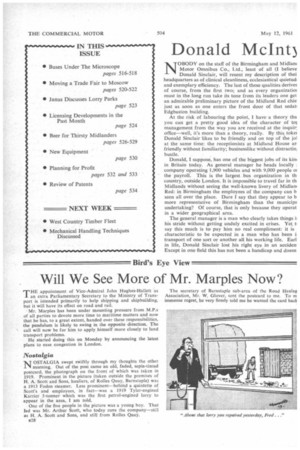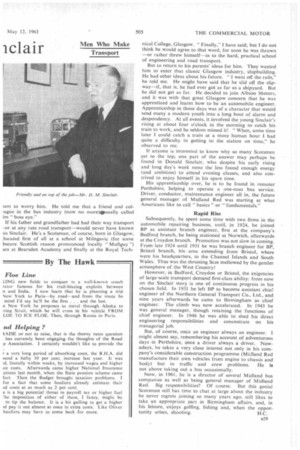Donald McInt3
Page 32

Page 33

If you've noticed an error in this article please click here to report it so we can fix it.
iclair
NOBODY on the staff of the Birmingham and Midlani Motor Omnibus Co., Ltd., least of all (I believe Donald Sinclair, will resent my description of thei headquarters as of clinical cleanliness, ecclesiastical quietudi and exemplary efficiency. The last of these qualities derives of course, from the first two; and as every organizatiot must in the long run take its tone from its leaders one get an admirable preliminary picture of the Midland Red chie just as soon as one enters the front door of that sedati Edgbaston building.
At the risk of labouring the point, I have a theory tha you can get a pretty good idea of the character of tot management from the way you are received at the inquir: office—well, it's more than a theory, really. By this tokei Donald Sinclair likes to be friendly and on top of the jol at the same time: the receptionists at Midland House art friendly without familiarity; businesslike without distractini bustle.
Donald, I suppose, has one of the biggest jobs of its kini in Britain today. As general manager he heads locally . company operating 1,900 vehicles and with 9,000 people cm the payroll. This is the largest bus organization in th country, outside London. It is impossible to travel far in th Midlands without seeing the well-known livery of Midlam Red: in Birmingham the employees of the company can b seen all over the place. Dare I say that they appear to b more representative of Birmingham than the municipa undertaking? Of course, that is only because they operat in a wider geographical area.
The general manager is a man who clearly takes things ii his stride without getting unduly excited in crises. Yet. ti say this much is to pay him no real compliment: it is characteristic to be expected in a man who has been il transport of one sort or another all his working life. Earl in life, Donald Sinclair lost his right eye in an accideni Except in one field this has not been a handicap and doesn :ern to worry him. He told me that a friend and col:ague in the bus industry (now no more)eisually called im "boss eye."
If his father and grandfather had had their way transport -or at any rate road transport—would never have known is Sinclair. He's a Scotsman, of course, born in Glasgow, Jucated first of all at a school at Milngavie (for some bscure Scottish reason pronounced locally " Mullguy ") ten at Bearsden Academy and finally at the Royal Tech
nical College, Glasgow. " I have said; but I do not
think he would agree to that word, for soon he was thrown —or rather threw himself—in to the hard, practical school of engineering and road transport.
But to return to his parents' ideas for him. They wanted him to enter that classic Glasgow industry, shipbuilding. He had other ideas about his future. " I went off the rails," he told me. He might have said that he slid off the slipway—if, that is, he had ever got as far as a shipyard. But he did not get as far. He decided to join Albion Motors, and it was with that great Glasgow concern that he was apprenticed and learnt how to be an automobile engineer. Apprenticeship in those days was of a character that would send many a modern youth into a long bout of alarm and despondency. At all events, it involved the young Sinclair's rising at about four o'clock in the morning to catch his train to work, and he seldom missed it! "When, some time later I could catch a train at a more human hour 1 had quite a difficulty in getting to the station on time," he observed to me.
If anyone is interested to know why so many Scotsmen get to the top, one part of the answer may perhaps be found in Donald Sinclair, who despite his early rising and long day's work none the less found enough energy (and ambition) to attend evening classes, and also contrived to enjoy himself in his spare time.
His apprenticeship over, he is to be found in remoter Perthshire, helping to operate a one-man bus service. Driver, conductor, maintenance engineer all in, the future general manager of Midland Red was starting at what Americans like to call " basics " or "fundamentals."
Rapid Rise Subsequently, he spent some time with two firms in the automobile repairing business, until, in 1924, he joined BP as assistant branch engineer, first at the company's Bedford branch, he being stationed at Norwich, afterwards at the Croydon branch. Promotion was not slow in coming. From late 1924 until 1931 he was branch engineer for BP, Bristol branch, his area extending from Bristol, where were his headquarters, to the Channel Islands and South Wales. Thus was the thrusting Scot mellowed by the gentler atmosphere of the West Country!
However, in Bedford, Croydon or Bristol, the exigencies of large-scale transport demand first-class ability: from now on the Sinclair story is one of continuous progress in his chosen field. In 1931 he left BP to become assistant chief engineer of the Northern General Transport Co., Ltd., and nine years afterwards he came to Birmingham as chief engineer. The climb was now accelerated. In 1943 he was general manager, though retaining the functions of chief engineer. In 1946 he was able to shed his direct engineering responsibilities and concentrate on his managerial job.
But, of course, once an engineer always an engineer. I might almost say, remembering his account of adventurous days in Perthshire, once a driver always a driver. Nowadays, he takes a very close interest not only in his company's considerable construction programme (Midland Red manufacture their own vehicles from engine to chassis and body) but in traffic and crew problems. He is not above taking out a bus occasionally.
Now, in 1961, he is a director of several Midland bus companies as well as being general manager of Midland Red. Big responsibilities? Of course. But this genial Scotsman still has time to chat at large about the industry he never regrets joining so many years ago, still likes to take an appropriate part in Birmingham affairs, and, in his leisure, enjoys golfing, fishing and, when the oppor
tunity arises, shooting. H.C.
























































































































